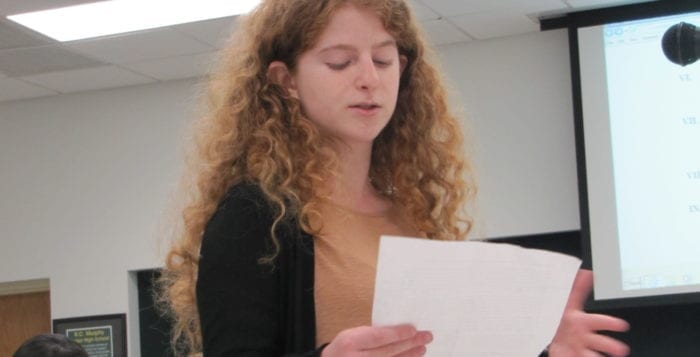Three Village board, students discuss ‘it’s about time’

By Andrea Paldy
Activism is strong in Three Village.
At the Sept. 18 Three Village school board meeting, parents, students and alumni came out in support of an issue that has concerned many members of the community: school start times.
“It’s very strenuous to strive for academic and personal success on half the medically recommended sleep time for people my age.”
— Sophia Zhukovsky
Earlier in the month, the board heard from parents in favor of later start times for the district’s three secondary schools. Last week, the board heard from Ward Melville graduates and students, themselves.
“Sleep deprivation does not have to be a part of Ward Melville culture,” said Sophia Zhukovsky, a sophomore at Stony Brook University and a Ward Melville graduate.
“Ward Melville has a great deal of high-achieving, dedicated and bright students, but it also has a great deal of exhausted students,” she said. “It’s very strenuous to strive for academic and personal success on half the medically recommended sleep time for people my age.”
Student and parent speakers echoed Zhukovsky’s sentiments. They described mornings as a “time of family anxiety and stress” and shared personal stories about the impact of sleep deprivation on family time and emotional health.
“Even 30 minutes would do a lot for students at the school in terms of both mental health and for fostering community,” wrote Kirti Nath, 2017 Ward Melville valedictorian. Nath couldn’t attend the meeting, but her letter was read to the board by high school student Natalia Newton.
“Ward Melville is undeniably one of the best public high schools that I know of, and I am incredibly grateful to have gotten my start there,” said Nath, a University of Pennsylvania sophomore. “I write this because I think that the Ward Melville experience can be even better.”
Annemarie Waugh, a local artist, P.J. Gelinas parent and founder of Sidewalks For Safety, said allowing students more time to sleep would “level the playing field” both athletically and academically. She added yet another concern.
“The system now encourages inexperienced teenage drivers to be driving in the dark at the same time other students are waiting on busy roads with no sidewalks in the dark,” she said. “This arrangement doubles the risk of tragedy.”
In addition to drawing even more supporters than the previous board meeting, the It’s About Time: Three Village Parents For A Later School Start Time movement gathered more than 1,400 signatures in a little more than a week.
But breaking through the chorus of support for a later secondary start time was Vincent Sperandeo, a parent of Ward Melville graduates. “Changing us would also mean that other districts would have to change as well,” he said.
He pointed out that Ward Melville was within the range of start times for surrounding school districts and changing Three Village’s junior high and high school start times would have to be done “in coordination with other districts.”
While Ward Melville starts at 7:05 am, nearby districts range in start time from the 7:02 a.m. warning bell at Miller Place High School to 7:10 a.m. at Comsewogue High School, 7:20 a.m. in Smithtown and 7:30 a.m. in Commack, Port Jefferson and Mount Sinai.
“The real world out there is not starting at 9 o’clock,” Sperandeo said. “The real world out there is starting when your job is telling you to start.”
Although districts in the immediate area have start times well before 8 a.m., schools across the nation have been taking a serious look at delaying start times. Ever since the American Academy of Pediatrics recommended in 2014 that secondary schools start no earlier than 8:30 a.m., attention to the issue has grown. The State of California has even gone so far as to propose a bill pushing back start times for all of its secondary schools.
According to research, biological changes in the adolescent circadian rhythms make it difficult for them to fall asleep before 11 p.m. Waking up to catch an early bus interrupts the later part of their sleep cycle, preventing them from getting the recommended 8 to 10 hours of sleep their developing bodies and brains need.
Researchers at Seattle’s University of Washington and the Salk Institute for Biological Studies in La Jolla, California, found that students at two Seattle high schools that changed to later start times got more sleep during the week, had fewer tardies and absences in their first period classes and had improved academic performance.
“Changing us would also mean that other districts would have to change as well.”
— Vincent Sperandeo
Despite the abundance of information favoring later start times, most U.S. high schools start before 8:30 a.m., and some schools that considered change decided against it because of logistics.
That’s why Barbara Rosati, founder of It’s About Time, has suggested that Three Village officials attend the Adolescent Health and School Start Times Workshop, in Pennsylvania, which would cover the “science, strategies, logistics and tips” for making a shift.
The Nov. 13 workshop is already full. However, the website indicated that the organizer — the national group, Start School Later — was considering a second session.
Superintendent Cheryl Pedisich, who described the research on later start times as “cogent, valid and reliable,” said last week that the district would begin phase 1 of its investigation into the shift. This would mean “data gathering” so that there could be “meaningful conversation,” she said.
This process, the superintendent said, would include surveys of parents, staff and students, as well as conversations with districts that have made the time change and those that considered it, but decided against it. Pedisich estimated that if the board moved forward with a committee, it would take shape in January.
“The last thing in the world we want to do is give the impression that we’re not listening,” said board president William Connors during a telephone interview. “Fourteen hundred signatures is compelling and shows we have to listen and do our due diligence.”
But there are also a lot of factors to consider, he added, such as the “domino” effect on other grades and the fact that a shift could cost the district “literally millions of dollars” in additional transportation costs.
“I don’t like the idea of kids getting up at 5 in the morning, but we have to look at the alternatives and establish our priorities,” Connors said.






